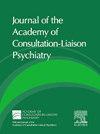Proactive Addiction Consultation for Hospitalized Patients With Opioid Use Disorder: A Pilot Study
IF 2.5
4区 心理学
Q2 PSYCHIATRY
Journal of the Academy of Consultation-Liaison Psychiatry
Pub Date : 2025-07-01
DOI:10.1016/j.jaclp.2025.04.002
引用次数: 0
Abstract
Background
Opioid use disorder (OUD) negatively impacts individuals, communities, and health care systems with significant morbidity and mortality. There is a need for early intervention with hospitalized patients with OUD to improve health outcomes. Proactive consultation-liaison psychiatry, with and without electronic health record tools, is an effective way to reach more patients in need and to improve health services outcomes. The impact of proactive addiction consultation is unknown.
Objective
To describe a pilot study examining the effects of proactive addiction consultation on service delivery and clinical outcomes for hospitalized patients with opioid use disorder.
Methods
This quasi-randomized, controlled pilot study tested whether, in hospitalized patients with likely OUD, early identification and prompts to initiate consultation resulted in an increased proportion of consultations completed as compared to usual care. Secondary outcomes included initiation of medication for OUD, leaving against medical advice, emergency room utilization, and hospital readmission. An electronic health record-generated daily report was used to identify patients admitted to the hospital in the previous day with diagnoses synonymous with OUD (e.g., opioid abuse and opioid dependence) or often associated with a co-occurring OUD (e.g., bacterial endocarditis and accidental overdose). Individuals confirmed through further chart review as having a high likelihood of OUD were assigned to intervention versus treatment-as-usual in a standardized fashion. The intervention consisted of our research team suggesting an addiction consultation if the patient agreed. Primary teams for the treatment-as-usual participants were not contacted, and consultations were only completed if the primary team independently requested them.
Results
Participants randomized to the intervention arm were significantly more likely to receive an addiction consultation (54.8% vs. 16.2%, P < 0.0001). There were no significant differences between the 2 groups in secondary outcomes. Secondary analyses showed that participants who received an addiction consultation (independent of group assignment) were significantly more likely to receive medication for OUD than those who did not (61.2% vs. 29.3%, P < 0.0001).
Conclusions
A proactive model suggesting addiction consultation in patients with likely opioid use disorder resulted in an increased proportion of completed consultations as compared to usual care. Addiction consultations were associated with initiation or continuation of medication for OUD, demonstrating the value of addiction consultation services in the hospital. More research is needed to show the potential impact of addiction consultation services on health outcomes.
阿片类药物使用障碍住院患者的主动成瘾咨询:一项试点研究
背景:阿片类药物使用障碍(OUD)对个人、社区和卫生保健系统产生负面影响,具有显著的发病率和死亡率。有必要对住院OUD患者进行早期干预以改善健康结果。主动咨询联络精神病学,无论有无电子健康记录(EHR)工具,都是接触更多有需要的患者和改善卫生服务成果的有效途径。主动成瘾咨询的影响尚不清楚。方法:这项准随机、对照的初步研究测试了在可能患有OUD的住院患者中,与常规护理相比,早期识别和提示开始咨询是否会增加咨询完成的比例。次要结局包括因OUD (OUD)开始用药、不遵医嘱出院、急诊室使用率和再入院。ehr生成的每日报告用于识别前一天入院的患者,其诊断与阿片类药物使用障碍(例如,阿片类药物滥用,阿片类药物依赖)相同,或通常与阿片类药物使用障碍共同发生(例如,细菌性心内膜炎,意外过量)。通过进一步的图表审查确认有高OUD可能性的个体以标准化的方式被分配到干预组和常规治疗组。干预包括我们的研究小组建议如果病人同意进行成瘾咨询。没有联系常规治疗参与者的主要小组,只有在主要小组独立要求时才完成咨询。结果:随机分配到干预组的参与者更有可能接受成瘾咨询(54.8% vs. 16.2%)。结论:与常规护理相比,主动模式表明,阿片类药物使用障碍患者的成瘾咨询导致完成咨询的比例增加。成瘾咨询与mod的开始或持续相关,证明了医院成瘾咨询服务的价值。需要更多的研究来显示成瘾咨询服务对健康结果的潜在影响。
本文章由计算机程序翻译,如有差异,请以英文原文为准。
求助全文
约1分钟内获得全文
求助全文
来源期刊

Journal of the Academy of Consultation-Liaison Psychiatry
Psychology-Clinical Psychology
CiteScore
5.80
自引率
13.00%
发文量
378
审稿时长
50 days
 求助内容:
求助内容: 应助结果提醒方式:
应助结果提醒方式:


